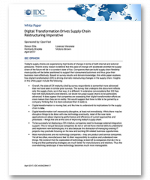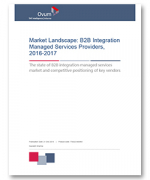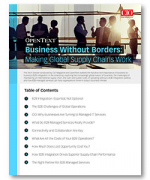Market Landscape: 2016-2017 B2B Integration Managed Services Providers
The state of B2B integration managed services market and competitive positioning of key vendors.
Catalyst
B2B integration managed services constitute a highly specialized market, more so in terms of cloudbased B2B integration managed services, with the laggards (in terms of innovation) slowly fading away and losing market share.
This is a comprehensive evaluation to help chief information officers (CIOs), B2B integration directors, enterprise/solution/integration architects, and integration competency center (ICC) directors/managers select a B2B integration managed services provider best suited to their specific requirements.
Ovum view
Digitalization and need for greater agility has forced IT leaders to look for alternatives to legacy electronic data interchange (EDI) solutions. Many enterprises have failed to realize the expected outcomes from existing B2B integration outsourcing engagements, and IT recognizes the need for a major change to tackle B2B integration challenges driven by customers, partners, and new regulatory compliance mandates.
From the perspective of the requirements of a large enterprise, B2B integration managed services represent a highly specialized market, and successful business outcomes call for a combination of a higher level of competency, in terms of expertise in core B2B integration pillars and the delivery of managed services.
There is a clear market shift, with the adoption of cloud-based B2B integration services growing at double-digit rate over the last two to three years. The value proposition of cloud-based integration services, especially from the perspective of flexible infrastructure provisions and greater predictability of IT costs, is attractive for large enterprises struggling to tackle B2B integration challenges with an inhouse approach or those tied with a “laggard” integration outsourcing or managed services provider.
Several B2B integration managed services providers have expanded or are working toward expanding their offerings in areas such as deployment options, APIs exposing specific functions, trading partner onboarding, end-to-end monitoring, and operational and process analytics.
Some have re-architected core B2B integration platforms to offer APIs for individual components and to support the extension of B2B integration capabilities to various on-premise and software-as-a-service (SaaS) application integration scenarios.
There is a gradual decline in the number of integration practitioners/consultants specializing in legacy EDI solutions, largely due to retirement and limited interest among the new generation of developers in pursuing EDI/B2B integration as a career option.
Moreover, in-house or legacy EDI solutions offer limited flexibility and scalability, which can be a major barrier to business growth, especially as enterprises focus on meeting a range of new requirements, including rapid trading partner onboarding, support for new protocols/messaging standards, process integration, and better community management and engagement.
According to Ovum’s estimates, resource-related costs can account for up to 60% of the total cost of ownership (TCO) for a legacy EDI solution. This trend has also contributed toward enterprises deciding to outsource B2B integration, which allows internal IT teams to focus on higher priority and more-strategic initiatives.
What’s Related




Favorites





